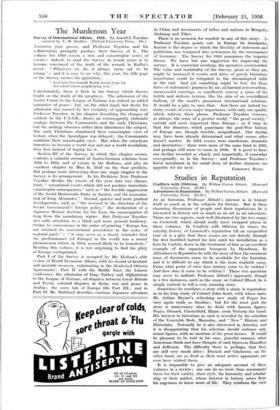The Murderous Year
ANOTHER year passes, and Professor Toynbee and his collaborators promptly produce their Survey of it. The volume for 1934 covers a rich and catastrophic series of events : indeed, to read the Survey in, recent years is to become convinced of the truth of the remark in -Kafka's novel : " Whatever we do, . it• always turns out to be wrong " ; and it is easy to see why, this year, the title page
of the Survey carries the quotation : _ _ " And mid this tumult Kubla heard from far Ancestral voices prophesying war."
Unfortunately, there is little in the Survey which throws doubt on the truth of the prophecy. The admission of the Soviet Union to the League of Nations was indeed an added guarantee of peace : but, on the other hand, her desire for admission was caused by her certainty of approaching war. Professor Toynbee, in his chapter describing the changes of outlook in the U.S.S.R., draws an extravagantly elaborate analogy between the Communists and the early Christians, but the analogy obscures rather than illuminates the subject. The early Christians abandoned their catastrophic view of history when the Apocalypse was delayed : the Communists maintain their catastrophic view. But when the cataclysm threatens to become a world war and not a world revolution, they fear instead of hoping for it.
Section III of the Survey, in which this chapter occurs, contains a valuable account of Austro-German relations from 1932 to 1934, and of events in the Balkans, and also an excellent chapter by Miss K. Duff on the Saar problem. But perhaps more interesting than any single chapter in the Survey is its arrangement. In his Prefatory Note Professor Toynbee divides the events of the' year into two classes. First, " sensational events which did not produce immediate catastrophic consequences," such as " the forcible suppression of the Social Democratic Party in Austria, and the assassina- tion of King Alexander." Second, quieter and more gradual dev=elopments, such as " the reversal in the direction of the Soviet Government's foreign policy," the declaration of a Japanese Monroe doctrine for the East, the emancipation of Iraq from the mandatory regime. But Professor Toynbec also calls attention to a third and more general tendency. Owing to convenience in the order of printing " Europe has not retained its conventional precedence in the -series of regional pacts" ; " it may serve as a timely reminder that the predominance (of Europe) in the world was a recent phenomenon which, in 1934, seemed likely to be transitory." Reading this volume, it is not SUrprising to find the glory of Europe extinguished.
Part I of the Survey is occupied by Mr. Hodson's able review. of World Economic Affairs, with its record -of hesitant and unstable recovery, culminating in the ill-advised Ottawa Agreements : Part II with the Middle East, the Islamic Conference, the admission -of Iraq, Tutkey and Afghanistan to the League of Nations, oil disputes_ between Great Britain and Persia, colonial -disputes in Syria;- war and peace in Arabia ; the sorry tale of Europe fills Part III ; and in Part IV Mr. Hubbard describes cautious Japanese advances
in China and movements of tribes and nations in Mongolia, Sinkiang and Tibet.
There is no occasion for comfort in any of this story. A, Professor. Toynbee points out, in Europe its dominating feature is the degree to which the frivolity of statesmen and politicians was tempered into seriousness by the rearmament of Germany. The Survey for 1934 announces the imperial theme. We have but one suggestion for improving the survey. It is somewhat overlong, the narrative overcrowded. The value and readability of the Survey, great as they are, might be increased if events and dates of purely transitory importance could be relegated to the chronological table at the end. And yet something might be lost, for those dates of statesmea's journeys by air, .of hurried conversations, unsuccessful meetings, so excellently convey a sense of the brittle and delicate texture, like the skin of an overinflated balloon, of the world's precarious international relations. It would be a pity to miss that. And there are indeed too many events of even major importance, with only one quality which relieves their gloom. Professor Toynbee conveys, as always, the sense of a greater world, " the great society," outside and more important than Europe : so it may be that the disasters which punctuate the post-War history of Europe are, though terrible, insignificant. Our decline may have been already determined and what comes after doesn't matter. In 1934 events were murderous, dramatic and destructive : there were more of the same kind in 1935, and perhaps still more to come in 1936. It is good to have our decline recorded as clearly and impartially, if somewhat over-grandly, as in the Survey : and Professor Toynbee's latest instalment in his serial story of decline sharpens our appetite for his next.
GORONVVY REES.














































 Previous page
Previous page